-
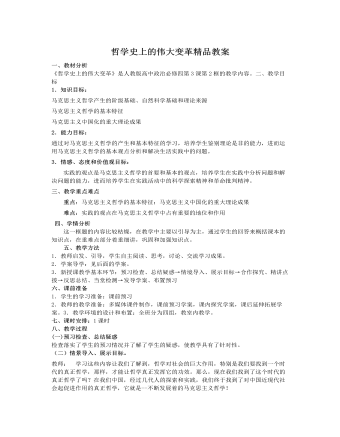
人教版高中政治必修4哲学史上的伟大变革精品教案
一、教材分析《哲学史上的伟大变革》是人教版高中政治必修四第3课第2框的教学内容。二、教学目标1.知识目标:马克思主义哲学产生的阶级基础、自然科学基础和理论来源马克思主义哲学的基本特征马克思主义中国化的重大理论成果2.能力目标:通过对马克思主义哲学的产生和基本特征的学习,培养学生鉴别理论是非的能力,进而运用马克思主义哲学的基本观点分析和解决生活实践中的问题。3.情感、态度和价值观目标:实践的观点是马克思主义哲学的首要和基本的观点,培养学生在实践中分析问题和解决问题的能力,进而培养学生在实践活动中的科学探索精神和革命批判精神。三、教学重点难点重点:马克思主义哲学的基本特征;马克思主义中国化的重大理论成果

新人教版高中英语必修3Unit 4 Space Exploration-Listening&Speaking&Talking教学设计一
Listening and Speaking introduces the topic of “talking about how to become an astronaut”. This period is aimed to inform students some details about the requirements of being an astronaut. Students can be motivated and inspired by the astronauts. Teachers ought to encourage students to learn from them and let them aim high and dream big.Listening and Talking introduces the theme of "talk about life in space". This part also informs students more details about life in space and can inspire students to be curious about this job. 1. Guide students to listen for numbers concerning dates, years and ages etc2. Cultivate students' ability to talk about how to become an astronaut and life in space ; 3. Instruct students to use functional sentences of the dialogue such as “ first of all, I am not sure, so what might be .. I guess.. I wonder…I am curious…)appropriately.1. Guide students to understand the content of listening texts in terms of the whole and key details; 2. Cultivate students' ability to guess the meaning of words in listening; discuss with their peers how to become a qualified astronaut and describe the life in space.Part 1: Listening and SpeakingStep 1: Lead inPredictionThe teacher can ask students to predict what the listening text is about by looking at the pictures.About how to become an astronaut./the requirements of an astronautStep 2: Then, play the radio which is about an interview a. And after finishing listening for the first time, the students need to solve the following tasks.

新人教版高中英语必修3Unit 4 Space Exploration-Discovering Useful Structure教学设计
The theme of the section is “Describe space facts and efforts to explore space”. Infinitives are one of non-finite verbs, as the subjects, objects, predicative, attributes and adverbials. This unit is about space exploration, which is a significant scientific activity, so every scientific activity has strong planning. Therefore, using the infinitives to show its purpose, explanations or restrictions is the best choice.1. Learn the structure, functions and features of infinitives.2. Learn to summarize some rules about infinitives to show purpose and modify.3. Learn to use infinitives in oral and writing English. 1. Learn the structure, functions and features of infinitives.2. Learn to summarize some rules about infinitives to show purpose and modify.3. Learn to use use infinitives in oral and writing English.Step 1 Lead in---Pair workLook at the following sentences and focus on the italicized infinitives. In pairs, discuss their functions. 1. I trained for a long time to fly airplanes as a fighter pilot..(作目的状语)2. As we all know, an astronaut needs to be healthy and calm in order to work in space..(作目的状语)3. First of all, you must be intelligent enough to get a related college degree..(作目的状语)4. Some scientist were determined to help humans realise their dream to explore space..(作定语)5. On 12 April 1961, Yuri Gagarin became the first person in the world to go into space..(作定语)Summary:1. 不定式的结构:to+do原形。2. 分析上面的句子,我们知道在描述太空探索时,动词不定式不仅可以用来表目的,还可以用来作定语,表修饰。

新人教版高中英语必修3Unit 4 Space Exploration-Listening&Speaking&Talking教学设计二
The themes of this part are “Talk about how to become an astronaut” and “Talk about life in space”. As Neil Armstrong said “Mystery creates wonder and wonder is the basis of man’s desire to understand. Space is difficult for human to reach, therefore, humans are full of wonders about it. However, if wanting to achieve the dream of reaching the Moon, some of our human should work hard to be an astronaut at first. Part A(Talk about how to become an astronaut) is a radio interview in a radio studio, where the host asked the Chinese astronauts about his story how to become an astronaut. Yang Liwei told his dreamed to be an astronaut since childhood. Then he worked hard to get into college at 22. The next 10 years, he gradually became an experienced pilot. At the same time, to be an astronaut, he had to study hard English, science and astronomy and trained hard to keep in good physical and mental health and to practise using space equipment. Part B (Talk about life in space) is also an interview with the astronaut Brown, who is back on the earth. The host Max asked about his space life, such as his emotion about going back the earth, the eating, shower, brushing, hobbies and his work. Part A and Part B are interviews. So expressing curiosity about the guests’ past life is a communicative skill, which students should be guided to learn.1. Students can get detailed information about how Yang Liwei became an astronaut and Max’s space life.2. Students learn to proper listening strategy to get detailed information---listening for numbers and taking notes.3. Students can learn related sentences or phrases to express their curiosity like “ I wish to know...” “I’d love to know...”4. Students can learn more about the space and astronauts, even be interested in working hard to be an astronaut

新人教版高中英语必修3Unit 4 Space Exploration-Reading and Thinking教学设计二
The theme of this unit focuses on “space exploration.” Students will learn about the training and experience needed to become an astronaut. The text is mainly about the development of space exploration. On the one hand, the text helps students to have a good understanding about the great feats humans have achieved, on the other hand, they will further understand the contributions that we Chinese have achieved, and feel confident and proud about our homeland and strengthen their love for our country. The teacher should instruct students to aim high and study harder to make great progress in the space career if possible.1. Read about the development and value of space exploration.2. Explore the mysteries of the universe and the achievements in space exploration.3. Skillfully use the vocabulary of this text to cultivate self-study ability 4. Develop cooperative learning ability through discussion.1. Enable the Ss to talk about the development and value of space exploration.2. Guide the Ss to summarize the main idea of each paragraph as well as the main idea of the text.3. Help Ss comprehend the main reasons for space exploration. Multi-media, textbook, notebooks.Step 1: Warming up and predictionLook at the title and the pictures of the text and predict what the text will be about?2. What are the main reasons for space exploration?

新人教版高中英语必修3Unit 4 Space Exploration-Reading and Thinking教学设计一
Q4: What is the function of the International exploration ?Having astronauts from different countries on boardQ5: What can you learn from Para 4 ?China has made great achievements in exploring spaceQ6: What is the attitude to the space exploration ?SupportiveStep 6 Post reading---RetellPeople have always wanted to learn more about space. Before the mid-20th century, most people felt (1)_________ (travel) into space was an impossible dream. However, (2)____ the help of scientists, peoplesucceeded in realizing their dream (3) _________ (explore) space. On 4 October 1957, the Sputnik 1 satellite (4) ____________(launch) by the USSR. (5) ________________ scientists try to make sure nothing goes wrong, accidents can still happen. These disasters made everyone(6)___________(disappoint), but people still believe in the importance of (7) ________(carry) on space exploration. In 2003, China became the third country to (8)_____________ (independent) send humans into space. Then Shenzhou 6 and 7 completed (9)____ second manned orbit and the first Chinese spacewalk. In spite of the difficulties, scientists hope future (10)__________ (discovery) will not only enable us to understand the universe but also help us survive well into the future.Answers: 1. travelling 2. with 3. to explore 4. was launched 5. Although6. disappointed 7. carrying 8. independently 9. a 10. discoveriesStep 6 Post reading---Critical thinkingQ1: What do you think of the space exploration ? I think it is beneficial to us. Through further study of space, people will make full use of it in the future, such as the space experiments by Wang Yaping in Tian Gong 1.Q2: If you are determined to be an astronaut, what should you prepare at present ?First of all, I should study hard to get a related college degree. Besides, I must keep mental and physical healthy.Step 7. HomeworkTry to summarize the structure of the article by a mind map.

新人教版高中英语必修3Unit 4 Space Exploration-Reading for Writing教学设计二
⑦在我看来, 探索太空是值得的。As far as I am concerned, it is worthwhile to explore the space.Step 10 Writing---draftRecently, students in our class have had heated a discussion on whether space is worth exploring. Students hold different ideas about it.30% of us think space exploration is not worthwhile. They think space is too far away from us and our daily life and is a waste of money. And the money spent on space exploration can be used to solve the earth’s problems such as starvation and pollution.On the other hand,70% think space is worth exploring because we have benefited a lot from it,such as using satellites for communication and weather forecast. What’s more,with further space research,we may solve the population problem by moving to other planets one day. Also,space research will enable us to find new sources to solve the problem of energy shortages on the earth.As far as I am concerned, it is worthwhile to explore the space. Not only can it promote the development of society but also enrich our life. Step 11 Pair workExchange drafts with a partner. Use this checklist to help your partner revise his/her draft.1.Does the writer explain why he/she changed/wanted to change?2.Does the writer tell how the changes have improved or will improve his/her life?3.Is the text well-organised?4.Does the writer use words and expressions to show similarities and differences?5.Are there any grammar or spelling errors?6.Does the writer use correct punctuation?

新人教版高中英语必修3Unit 4 Space Exploration-Reading For Writing教学设计一
另一方面,其余的人反对这个计划,因为它可能会导致一些不好的影响。7.I hold the belief that space exploration not only enable us to understand how the universe began but also help us survived well into the future.我坚信探索太空不仅能够使我们了解宇宙的起源而且能够帮助我们更好地走进未来。8.I think we should spend more time and money exploring space so as to provide new and better solutions to people's shortterm and longterm problems.为了给人类的短期和长期问题提供更新和更好的解决方法,我认为我们应该花更多的时间和金钱来探索太空。9.From my point of view,it is wrong of young people to depend on their telephones too much,which may do harm to both their physical and mental health.在我看来,年轻人过度依赖手机是不对的,因为它们可能会对他们的身心健康都有害。最近你班同学就“人类是否应该进行宇宙探索”这个问题进行了激烈的讨论。有人认为,探索宇宙不仅让人类更好地了解宇宙的发展,还可以用来指导农业生产,以及把一些探索太空的高新技术用于现实生活;也有一些人认为探索太空花掉了大量的人力物力;影响了人们的生活水平。请你根据以下情况写一篇报告并发表自己的观点。注意:1.写作内容应包括以上全部要点,可适当发挥,使上下文连贯;

新人教版高中英语选修2Unit 4 Journey Across a Vast Land教学设计
当孩子们由父母陪同时,他们才被允许进入这个运动场。3.过去分词(短语)作状语时的几种特殊情况(1)过去分词(短语)在句中作时间、条件、原因、让步状语时,相当于对应的时间、条件、原因及让步状语从句。Seen from the top of the mountain (=When it is seen from the top of the mountain), the whole town looks more beautiful.从山顶上看,整个城市看起来更美了。Given ten more minutes (=If we are given ten more minutes), we will finish the work perfectly.如果多给十分钟,我们会完美地完成这项工作。Greatly touched by his words (=Because she was greatly touched by his words), she was full of tears.由于被他的话深深地感动,她满眼泪花。Warned of the storm (=Though they were warned of the storm), the farmers were still working on the farm.尽管被警告了风暴的到来,但农民们仍在农场干活。(2)过去分词(短语)在句中作伴随、方式等状语时,可改为句子的并列谓语或改为并列分句。The teacher came into the room, followed by two students (=and was followed by two students).后面跟着两个学生,老师走进了房间。He spent the whole afternoon, accompanied by his mom(=and was accompanied by his mom).他由母亲陪着度过了一整个下午。
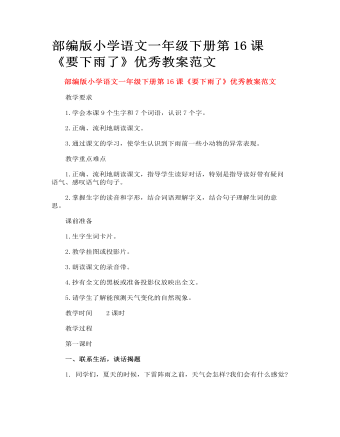
部编版小学语文一年级下册第16课《要下雨了》优秀教案范文
由扶到放,学习课文 1.指导学习一至三段。 (1)指名读第一段。学习生字"弯、直",通过做动作理解词义。 (2)练习朗读第一段,可边读边做动作。 (3)教师引读第二段:小燕子从他头上飞过。小白兔大声喊--(学生读)。 (4)引导学生看第一幅挂图:小燕子飞得很低,小白兔奇怪地向燕子为什么飞得这么低。学生练习朗读小白兔喊叫的句子,提醒学生注意提示语"大声喊"和句尾问号。 (5)先指名读第三段,然后逐句以问引读: ① 教师指第一句问:燕子边飞边说-- ②空气怎么样呢--(学生接读第二句)虫子的翅膀可比鸟的翅膀小多了,薄多了,就像透明的纱一样,沾上了小水珠,就像人背上了铅球一样沉重,自然就飞不高了。再读第二句。 ③那小燕子飞不高是什么原因呢?学生读最后一句,教师板书:捉虫子,学习生字"捉",练习朗读句子。
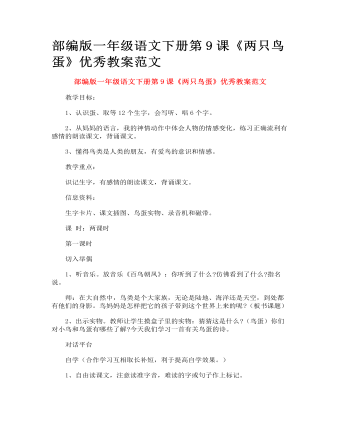
部编版一年级语文下册第9课《两只鸟蛋》优秀教案范文
朗读(读说思议练结合,培养学生语文综合能力。) 1、学习第一小节: (1)指名读,回忆刚才摸鸟蛋的感觉(小小的、凉凉的)体会着读一读。 (2)比较“鸟蛋凉凉的”和“凉凉的鸟蛋”:你发现了什么?(引导学生发现这类词语的特点:词序不同,但表达的意思相同。)除了凉凉的鸟蛋还有什么是凉凉的? (3)你还能像这样再说几个吗? (如果学生说不出来,教师可进行指导,把写有“花儿、小草、柳枝、大海,红红的、绿绿的、软软的、蓝蓝的”的词语卡分给学生,让拥有不同词语的学生去找朋友,再让两个朋友变换左右顺序。) 2、学习第二小节: (1)轻声读文,思考:你怎么知道两只鸟蛋就是两只小鸟? (2)出示小鸟破壳的图片或课件,引导学生说一说。 (3)启发想象:鸟妈妈焦急不安是什么样?你能表演一下吗? 表演后试着把妈妈的语气读出来。 (4)你还能用焦急不安说句话吗?看谁说得和别人不一样?
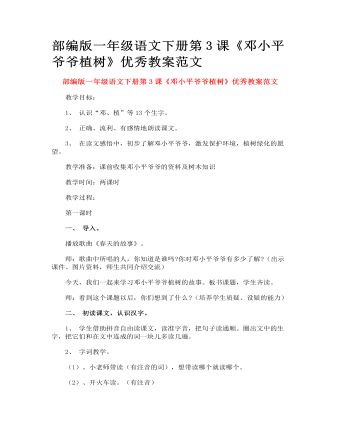
部编版一年级语文下册第3课《邓小平爷爷植树》优秀教案范文
读文感悟。 1、出示:邓小平爷爷( )地种柏树。 师:同学们带着这个问题仔细读课文,用“——”划出有关句子。然后想一想,“( )”里填什么词比较恰当。 2、生自由读课文,边读边划。 3、 全班汇报交流。 师:你认为邓小平爷爷( )地种柏树,从哪些地方体现出来? (以读为主,引导学生学会读课文,尊重学生个性化的理解。“( )”里可填“起劲、仔细、认真、一丝不苟、小心”等等,随机进行读文,结合语言文字训练,体会邓小平爷爷积极为祖国绿化作贡献的精神。) (如:找出邓小平爷爷种树的动作词“挖、挑选、移、填、站在、扶正”,同桌伙伴,一人做动作,一人口述植树过程。“移”字可换“放”字比较理解。) 4、 四人小组讨论:邓小平爷爷为什么种树?他是怎么想的? (结合课前收集的邓小平爷爷的资料理解,体会邓小平爷爷一心为国之心,激发学生参与绿化的热情。)
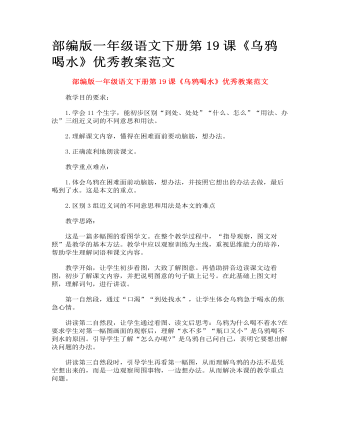
部编版一年级语文下册第19课《乌鸦喝水》优秀教案范文
教学思路: 这是一篇多幅图的看图学文。在整个教学过程中,“指导观察,图文对照”是教学的基本方法。教学中应以观察训练为主线,重视思维能力的培养,帮助学生理解词语和课文内容。 教学开始,让学生初步看图,大致了解图意。再借助拼音边读课文边看图,初步了解课文内容,并把说明图意的句子做上记号。在此基础上图文对照,理解词句,进行讲读。 第一自然段,通过“口渴”“到处找水”,让学生体会乌鸦急于喝水的焦急心情。 讲读第二自然段,让学生通过看图、读文后思考:乌鸦为什么喝不着水?在要求学生对第一幅图画面的观察后,理解“水不多”“瓶口又小”是乌鸦喝不到水的原因。引导学生了解“怎么办呢?”是乌鸦自己问自己,表明它要想出解决问题的办法。 讲读第三自然段时,引导学生再看第一幅图,从而理解乌鸦的办法不是凭空想出来的,而是一边观察周围事物,一边想办法。从而解决本课的教学重点问题。
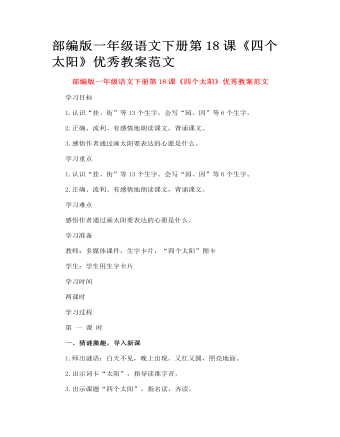
部编版一年级语文下册第18课《四个太阳》优秀教案范文
猜谜激趣,导入新课 1.师出谜语:白天不见,晚上出现。又红又圆,照亮地面。 2.出示词卡“太阳”,指导读准字音。 3.出示课题“四个太阳”,指名读,齐读。 4.引导质疑:读了课题,你的小脑瓜里是不是蹦出了小问号? 二、初读课文,认记生字 1.出示课件:带拼音生字,指名带读。 2.出示课件:去拼音生字并打乱顺序,摆字卡,自由练习朗读。 3.游戏:我说你找喊名字。 4.指导识记生字方法。 5.巩固游戏:我把生字送回家。动画演示,指导写字 1.猜谜引入:大口框里有个“大” 2.出示课件:“因”书写笔顺规则 看了动画,你知道了什么? 3.出示课件:“园” “园”与“因”哪里长得很像?书写的时候要注意些什么?(同样先里面后封口) 4.师范写“园”“因”,讲解书写要领。 5.生自由练写,师巡回指导。 6.集体评价。
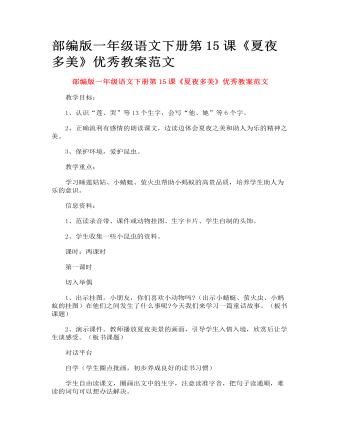
部编版一年级语文下册第15课《夏夜多美》优秀教案范文
自学(学生圈点批画,初步养成良好的读书习惯) 学生自由读课文,圈画出文中的生字,注意读准字音,把句子读通顺,难读的词句可以想办法解决。 识字(多种方式巧记生字,激发学生主动识字的愿望) 教师出示生字词,学生互相交流自己的识字秘诀(如歌谣识字、猜谜识字、做动作识字、偏旁归类识字等) (部分学生识字方法单一、枯燥,互相交流利于学生反思,开动脑筋巧记生字;另外对于学生的识字秘诀,教师要及时鼓励,让他们体验到主动识字的乐趣。) 朗读(多层次自主阅读,拓展思维空间,提高阅读质量。) 1、检查读。教师以开火车的形式让学生按自然段读课文,看谁读得既正确又流利。 2、指正读。把你喜欢的小动物的话找出来读一读,教师随机指导。 3、想象读。先听范读录音,然后指名读文,边读边想象当时的情景。 4、分角色读。教师指导学生研究讨论每个角色的语气怎样读,并尝试给这些角色设计表情动作。
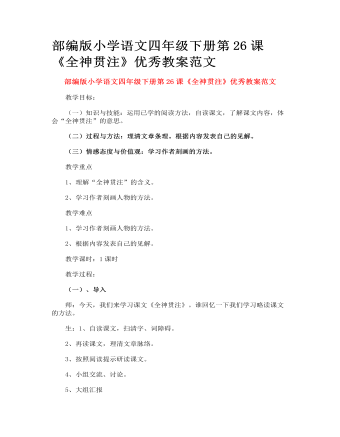
部编版小学语文四年级下册第26课《全神贯注》优秀教案范文
(一)、导入 师:今天,我们来学习课文《全神贯注》。谁回忆一下我们学习略读课文的方法。 生:1、自读课文,扫清字、词障碍。 2、再读课文,理清文章脉络。 3、按照阅读提示研读课文。 4、小组交流、讨论。 5、大组汇报 (二)、按照学习方法,进行学习。 (三)、(以小组为单位)汇报学习情况。 1、小组1:读课文,并讲解不理解的词义。 提醒易读错的字音和易写错的生字。
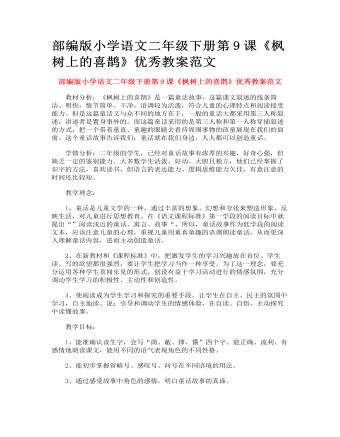
部编版小学语文二年级下册第9课《枫树上的喜鹊》优秀教案范文
教材分析:《枫树上的喜鹊》是一篇童话故事,这篇课文叙述的线条简洁、明快,情节简单、干净,语调较为活泼,符合儿童的心理特点和阅读接受能力。但是这篇童话又与众不同的地方在于,一般的童话大都采用第三人称叙述,讲述者是置身事外的。而这篇童话采用的是第三人称和第一人称穿插叙述的方式,把一个带着童真、童趣的眼睛去看待周围事物的孩童展现在我们的面前。这个童话故事告诉我们:童话就在我们身边,人人都可以创造童话。 学情分析:二年级的学生,已经对童话故事有浓厚的兴趣,好奇心强,但缺乏一定的鉴别能力。大多数学生活泼、好动、大胆且独立,他们已经掌握了识字的方法,喜欢读书,但语言的表达能力、逻辑思维能力欠佳,有意注意的时间还比较短。
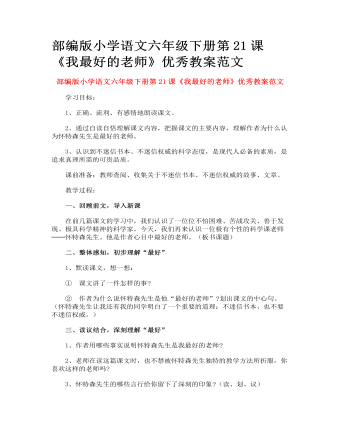
部编版小学语文六年级下册第21课《我最好的老师》优秀教案范文
嗅苹果 学生们向苏格拉底请教:怎样才能坚持真理? 笑容可掬的苏格拉底让大家坐下来,随后取出一个苹果。他用手指捏着,慢慢地从每个同学的座位旁边走过,一边走一边说:“请同学们集中精力,注意嗅一嗅空气中的气味。” 然后,他回到讲台上,把苹果举起来左右晃了晃,问:“哪位同学闻到了苹果的气味儿?” 有一位同学举手回答:“我闻到了,是香味!” 苏格拉底再次走下讲台,举着苹果,慢慢地从每一个学生的座位旁边走过,边走边叮嘱:“请同学务必集中精力,仔细嗅一嗅空气中的气味。” 稍停,苏格拉底第三次从讲台走到学生们中间,让每一个学生再嗅一嗅苹果的气味。
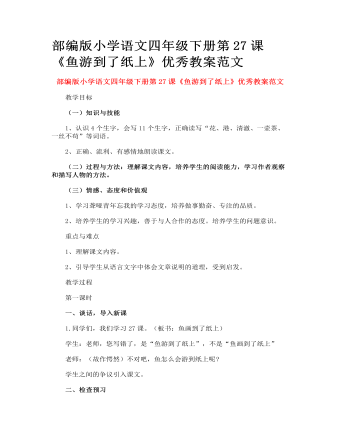
部编版小学语文四年级下册第27课《鱼游到了纸上》优秀教案范文
1.想想课文讲了一件什么事?“鱼游到了纸上”的意思是什么?(“我”去玉泉观鱼,认识了一位残疾青年,他每个星期天都来这里画金鱼。“鱼游到了纸上”意思是说这位青年画的金鱼十分形象生动,像活的那样在纸上游动。学生可以从整体感知课文内容,只要大致说出课文讲了一件什么事就行了。)2.你是怎么知道这位青年是聋哑人?找出课文中的有关语句。(“从来不说一句话”“没有任何反应”,和他胸前佩戴的“福利工厂”的厂徽,可以看出他是一位聋哑青年。如果是会说话的人,不可能从来不说一句话;如果是听得见的人,那么在众人的赞叹、议论声中,不可能“没有任何反应”;“福利工厂”一般是专为残疾人开办的工厂。)
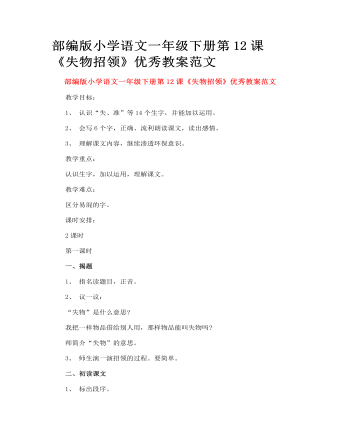
部编版小学语文一年级下册第12课《失物招领》优秀教案范文
读课文,感悟 1、 齐读第一自然段。 2、 你知道了什么时间什么人去干什么? 3、 植物园怎么样?同学们参观认真吗?你怎么知道的? 4、 指名读第一自然段,创设情境比比谁读得更棒。注意“可”要读出抑扬感。 5、 接下来的3、4、5、6自然段朗读,师读旁白,学生只要读说的一句话,但要结合叙述加进动作、表情等等。 6、 小组内练习,师巡视指导。 7、 各自读第7自然段,说说如果当时是自己在场会怎样想,怎样做。 8、 齐读第8自然段,师提示“会心的微笑”处要读得缓慢、高兴。 9、 讨论“会心的微笑”是什么意思,适当扩展。 10、 自荐读,比比谁读得更生动(从语音、语气、表情等方面评价)。 11、 各自读课文,要求: 完整、仔细,觉得有意思的地方多读读。努力读出自己的最佳样子。

